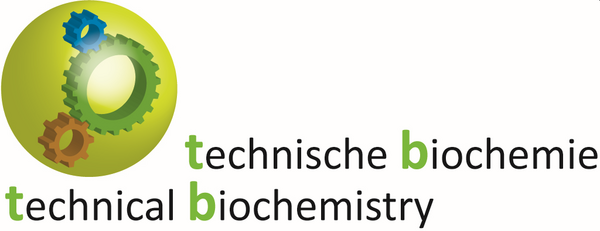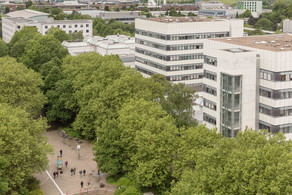Lectures
Bachelor
The biosynthesis of biomolecules such as nucleic acids, proteins and fatty acids, as well as linear and cyclic metabolic pathways, including the citric acid cycle, glycolysis, mevalonate pathway, shikimate pathway, photosynthesis, steroid biosynthesis are taught.
The content focus is on signal transduction and cellular functions, including proteins as tools, principles of intra- and intercellular communication such as hormonal control of complex systems.
The module introduces the use of the English language through case studies of science and technology communications from the fields of bioengineering and chemical engineering; case studies include written documents/publications written in English and authentic audio examples of popular scientific design on topics from the two engineering disciplines. The focus of the exercise is on the use of the English language as students paraphrase and comment on provided publications from the daily press or magazines (e.g. Times , Scientific American, etc.) as well as from professional organs in English in written or oral form. In addition, an independently prepared (group or individual) presentation will be presented.
Introduction, definition of pharmaceutical biotechnology, basic operations, working techniques for recombinant pharmaceutical proteins, cultivation techniques for producers, GMP production, pharmaceutical bioanalytics, vaccines, somatic gene therapy, transgenesis, pharmaceutical information, patenting, drug approval.
Bachelor
The lecture provides basic knowledge of microbiology with a focus on bacteriology. After a brief introduction, the following topics are discussed: 1. cell structures and systematics of bacteria, 2. the prokaryotic cell, 3. growth and nutrition, 4. endospores, 5. sterilization, disinfection, food preservation, 6. degradation of organic substances, 7. oxidation of inorganic compounds, 8. bacteria as "recycling experts" - the major material cycles: C, N, S
The module introduces the use of English in case studies of scientific and technical communications from the fields of bioengineering and chemical engineering; written documents / publications written in English as well as authentic audio examples of popular science on topics from the two engineering disciplines serve as case studies. The focus of the exercise is on the use of the English language, in which students paraphrase and comment on publications from the daily press or magazines (e.g. Times, Scientific American, etc.) as well as from specialist organs in English in writing or orally. In addition, an independently prepared (group or individual) presentation will be presented.
The basics of the history of medicine and scientific historical work such as evaluating historical sources are taught.
Examples of topics covered in the lecturer's presentations include the history of quinine, rubber, morphine / opiates, solvents, plant extraction
processes, aspirin, cocaine / local anaesthetics and animal testing. The biographies of
outstanding researchers are presented and the social, cultural and economic
effects of natural substances are discussed.
The lecture provides an overview of important pathogenic microorganisms (viruses, bacteria, fungi, protozoa, worms) and the diseases they cause. How do these microorganisms enter the body and how does the human body defend itself with its immune system? Which antibiotics and other remedies are effective against which organisms? The emergence of resistance and the production of new antibiotics are also dealt with, as are new defense strategies (e.g. new sites of action for antibiotics, intervention in “quorum sensing”). Non-antibiotic, antibacterial agents are also presented. Finally, methods for the sterilization of pharmaceutical products as well as disinfectants and disinfection methods are discussed.
Master
Introduction, definition of pharmaceutical biotechnology, basic operations, working techniques for recombinant pharmaceutical proteins, cultivation techniques for producers, GMP production, pharmaceutical bioanalytics, vaccines, somatic gene therapy, transgenesis, pharmaceutical information, patenting, drug approval.
The execution of large theses such as the master's thesis requires not only scientific aptitude but also an examination of questions concerning structure, design and content. Students are expected to have a high level of learned competence in order to plan and carry out a long scientific work in the laboratory and to record results. The subsequent theoretical processing, analysis and evaluation requires a skillful handling of the current literature and the use of databases. The goal of the course is to introduce students to scientific work, with particular attention to aspects of the philosophy of science, personal self-knowledge of science, and philo- sophic embedding. Furthermore, methods for stress reduction (yoga, meditation) will be introduced, time planning as well as dealing with complex workflows will be analyzed, and communication within the team and dealing with failure and unexpected results will be discussed.
The lecture "Introduction to Protein Chemistry" deepens the understanding of proteins. Biosynthesis and structure formation as well as the detection and modification possibilities of post-translational protein modifications (disulfide bridges, glycosylation) are discussed. Bioinformatic tools are presented with which proteins can be characterized and visualized in silico. This will be tried out by the students themselves on examples in the computer pool. In the practical part of the course, the students are expected to independently create a working procedure for the enzyme kinetic characterization of an enzyme and then apply it in practice.
Master
The lecture Technical Biochemistry deals with the industrial application of biochemical processes in technical plants, such as biogas plants, citric acid production, biodiesel extraction or biotechnical vanillin production. During the lecture, process examples and material flows are discussed and consolidated in joint exercises. Practicals are offered.
The completion of major theses such as the Master's thesis requires not only scientific aptitude but also an examination of questions relating to structure, design and content. Students are expected to have acquired a high level of competence in order to plan and carry out lengthy scientific work in the laboratory and to record the results.
The subsequent theoretical processing, analysis and evaluation requires skillful handling of current literature and the use of databases. The aim of the course is to introduce students to scientific work, with a particular focus on aspects of scientific theory, personal self-knowledge of science and philo-
sophical embedding. Furthermore, methods for stress reduction (yoga, meditation) are introduced, time planning and dealing with complex work processes are analyzed and communication within the team and dealing with failure and unexpected results are discussed.
Basics and advanced principles of toxicology will be critically discussed. The focus is on the toxicology
of industrial and environmental relevant xenobiotics used in chemical synthesis, production and with
relevance to workers and consumers. Main topics of this lecture are toxicokinetic, routes of xenobiotic
application, acute and chronic exposure, detoxification and antidotes, examples of industrial relevant
compounds like industrial gases, skin irritating and allergic compounds, toxicity testing, mutagenesis,
toxicology of solvents in industry, toxicology of microbial contaminations, human health risk analysis
and measures of prevention, ecological risk assessment.
The basics of the history of medicine and scientific historical work such as evaluating historical sources are taught.
Examples of topics covered in the lecturer's presentations include the history of quinine, rubber, morphine / opiates, solvents, plant extraction
processes, aspirin, cocaine / local anaesthetics and animal testing. The biographies of
outstanding researchers are presented and the social, cultural and economic
effects of natural substances are discussed.
The lecture provides an overview of important pathogenic microorganisms (viruses, bacteria, fungi, protozoa, worms) and the diseases they cause. How do these microorganisms enter the body and how does the human body defend itself with its immune system? Which antibiotics and other remedies are effective against which organisms? The emergence of resistance and the production of new antibiotics are also dealt with, as are new defense strategies (e.g. new sites of action for antibiotics, intervention in “quorum sensing”). Non-antibiotic, antibacterial agents are also presented. Finally, methods for the sterilization of pharmaceutical products as well as disinfectants and disinfection methods are discussed.





